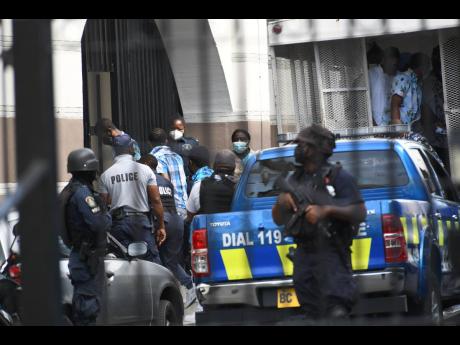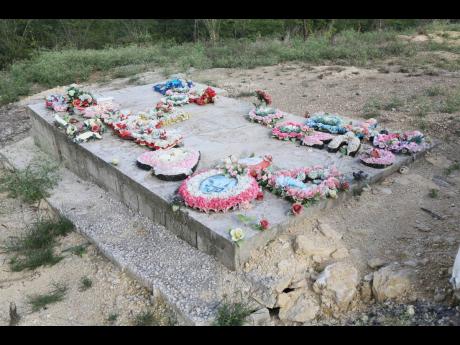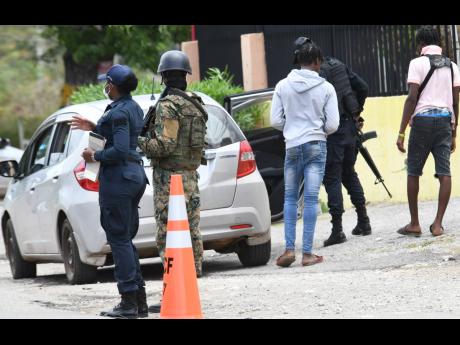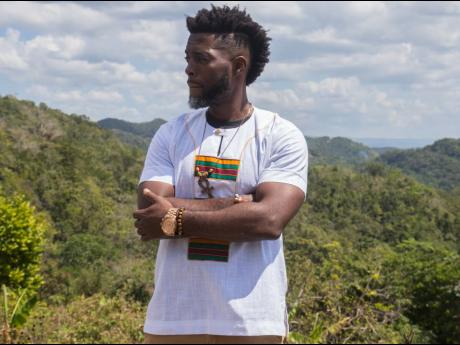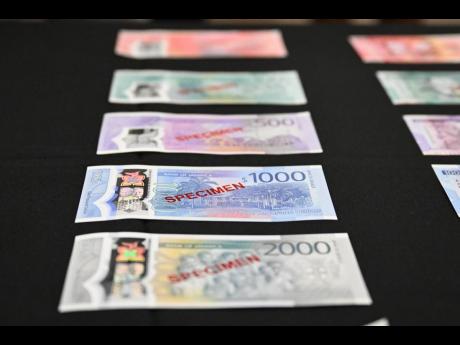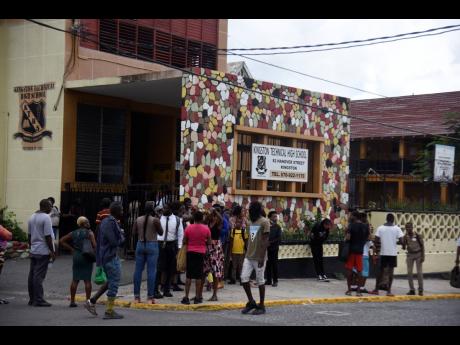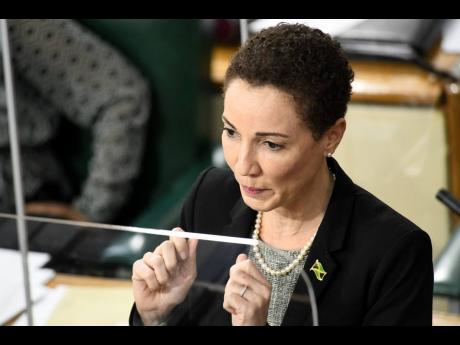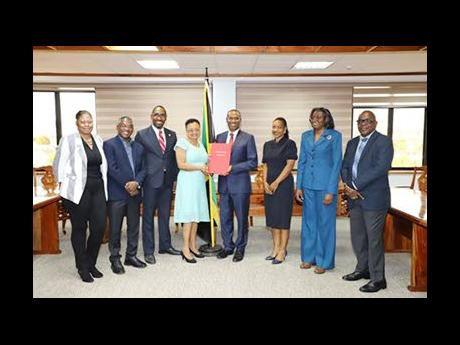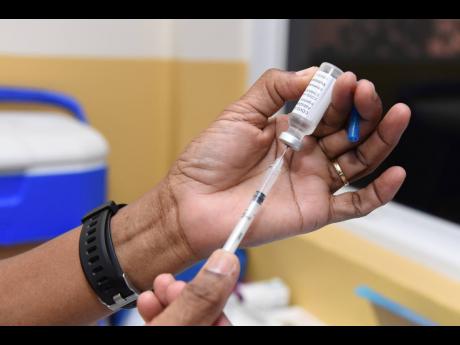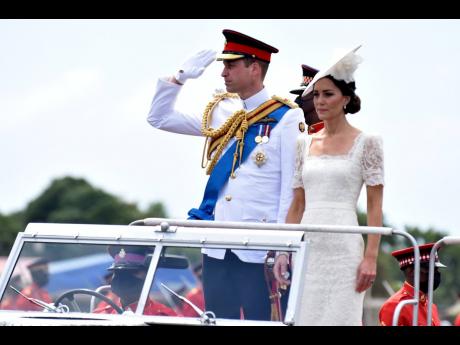News that made the headlines in 2022
The year 2022, like any new year, dawned with rays of hope for Jamaica to be a better place in all manner, and that we would be free from the clutches of COVID-19. It was a year which saw a rise in murders, a failed bid by Jamaican foreign minister to be the Commonwealth secretary general, history being made with the Jamaica Defence Force appointing their first female chief of defence staff, to the announcement of the introduction of new banknotes...and the states of emergency saga that continues. Here is a selection of some of the top stories of 2022.
ONE DON-CLANSMAN TRIAL
1. The One Don-Clansman gang trial, the biggest prosecutorial challenge to a major criminal network targeting 33 alleged members, had many dramatic twists. The trial provided insight from two self-confessed cronies into the inner workings of a criminal empire that unleashed a reign of terror in Spanish Town and the Corporate Area at the behest of reputed leader Andre ‘Blackman’ Bryan.
The allegations cast light on the intricate operational structure of One Don, a breakaway faction of the Clansman Gang, and the reported bloodlust of its members who faced charges of murder, conspiracy to murder, and other serious crimes.
Witness testimonies outlined a narrative of uninhibited brutality – from the murder-arson of a couple to the relish with which Blackman laughed at the recount of One Don’s terror. The gang’s tentacles ran deep, the witnesses claimed, spanning police, a serving soldier who was bodyguard to Bryan, and an entertainer who allegedly facilitated overseas travel under dubious reasons.
The accused included top-tier power brokers like ‘City Puss’ and the only woman prosecuted, Stephanie ‘Mumma’ Christie, who allegedly sought to rally the gangsters to unleash mayhem subsequent to Blackman’s arrest, because his infamy was being undermined by inaction.
But the prosecution’s case has been hobbled by a series of procedural missteps by both the police and prosecutors, who have been castigated by the presiding judge, Chief Justice Bryan Sykes, over a failure to obtain evidence and secure chain of custody, among other errors.
Sykes’ repeated scolding of the Crown triggered public fears that the entire case would have collapsed.
Eventually, five of the 33 accused were freed and several charges against the remaining 27 were dropped or deemed inadmissible. One accused who was on bail was murdered.
RISE IN MURDERS
2. Murders rose by two per cent to almost 1,500 – a psychologically troubling milestone as one of the bloodiest years in modern Jamaican history.
Few homicides transfixed public attention and generated outrage like the killing of 31-year-old Kemisha Wright and her four children, including a 23-month-old infant.
Dubbed the Newsmaker of the Year, Rushane Barnett was sentenced to more than 60 years for the heinous killing that jolted the Clarendon district of Cocoa Piece. The graphic details of the grisly deaths – including dozens of stabs and other cuts to all five bodies – refocused attention on the death penalty, as well as the spate of domestic disputes islandwide.
Besides the Barnett massacre, there were other murders that sparked public interest, street protests, and social media fury.
Among those was the murder of nine-year-old Gabriel King, whose throat was slit in bizarre circumstances after his mother claimed she was attacked by carjackers.
The police have cited difficulty in gathering information from the child’s family, with the mother, Amoi Leon Issa, launching a legal challenge to prevent the police from accessing information on her mobile phone.
But it was the presumed murder of social media influencer Donna-Lee Donaldson that precipitated a massive social media lobby and weekly street protests which really held public attention.
The 23-year-old, who was last seen with her boyfriend, Police Corporal Noel Maitland, vanished, but pressure from relatives and friends turned the scrutiny on Maitland and a policewoman, who has since been cleared. Despite pleas from the police for the public not to engage in a character lynching of the accused, it is widely held that it was the ceaseless advocacy that pushed law enforcers to proceed with the prosecution, even though Donaldson’s body has never been found.
Evidence placed before the court purported that Maitland wove a contorted web to hide the alleged murder, including having a couch cleaned of what the Crown believes was blood.
The murder of ‘Slickianna’, another social media celebrity, appeared to bear similarities with the high-pro Maitland-Donaldson case.
Little is known of the circumstances that led to Aneka Townsend’s body being found at sea. The manhunt for the suspect, Rushawn Patterson, intensified after information emerged about his involvement in another murder case years earlier that collapsed.
STATES OF EMERGENCY
3. States of emergency (SOEs) remained the clearest line of division between the Holness administration and the parliamentary Opposition, a philosophical rift that centred around combating Jamaica’s greatest crisis: violent crime.
Besides an agenda of legislative reform to the Constitution, the Bail Act, the Firearms Act and the Corrections Act, the Government has maintained its dependence on SOEs as a crucial crime-fighting tool.
That led to the Government twice reactivating the emergency measure after the Opposition indicated that it would not support extensions through the Senate.
While the administration insisted that SOEs brought down murders, the Opposition cited the likelihood of criminals being displaced. It also referenced the Government’s two lost constitutional fights of SOEs, including an $18-million judgment that may open the State to further challenges. The Opposition hinted that it might seek a ruling from the courts on the constitutionality of back-to-back SOEs, which it views as an attempt to circumvent checks on power.
HOLNESS AND CURRIE CLASH
4. Prime Minister Andrew Holness clashed with Accompong Chief Richard Currie, the flamboyant and controversial leader who has revived notions of Maroon sovereignty.
Relations with Accompong soured after Currie and allies chased a policeman from Maroon territory. That mood worsened after it was revealed that the State had pulled back on Accompong investments and project financing over which the Maroons may have had sway. A deadly shoot-out at the tail end of the annual treaty celebrations in January 2022 raised questions of whether the area, as run, was governable.
Warning that “not one inch of Jamaica will come under any other sovereign authority”, Holness warned that innocuous-looking movements sometimes evolved into guerrilla groups that caused states to break down.
NEW WAVE OF COVID-19
5. As a new wave of COVID-19 infections threatened Jamaica in January, Prime Minister Andrew Holness faced down critics who called for a reimposition of tough protocols to curb the spread.
But Holness was emphatic that the virus-weary country would not return to restrictions which had had a punishing effect on the economy and other areas of national life. More than 3,400 persons have died from COVID-19 complications.
The refrain “Argument done!” became an enduring slogan of resistance to the loud pro-lockdown lobby.
That decision was vindicated as hospitalisations never returned to the levels of overcapacity experienced in August 2021 that jeopardised service standards, starving medical facilities of bed space and oxygen.
The year saw a full return to schooling and a rejuvenation of the events industry, which had been locked down for most of the previous two years. The economy has grown for six consecutive quarters.
HISTORY MADE AT JDF
6. Rear Admiral Antonette Weymss Gorman broke the glass ceiling by becoming the first woman to lead the Jamaica Defence Force.
The career soldier succeeded Lieutenant General Rocky Meade as chief of defence staff in January.
She faced two major tests in her first year as army chief.
First, soldiers came under fire for alleged excessive use of force in clashes, including deadly incidents, in states of emergency or zones of special operations.
And second, the recall of a senior officer from duty overseas in a sex-assault scandal tested her steel in an organisation that has been defined by machismo and chauvinism. The officer was shown the door and complainants told to make formal reports to the police.
The army sought to downplay the alleged offences as sexual harassment and challenged The Gleaner’s claim that about 16 women had been victims, but did not counter with any specific figure.
PRINCE WILLIAM AND KATE VISIT
7. Prince William and Kate’s Caribbean tour was billed as a charm offensive in the 70th year of Queen Elizabeth II’s reign.
However, the royal visit rekindled anticolonial ire as demonstrators in Kingston and St James demanded reparation for nearly two centuries of British slavery.
Prime Minister Andrew Holness told Prince William that Jamaica was “moving on”, ditching the vestiges that retained the Queen as head of state. Legal and Constitutional Affairs Minister Marlene Malahoo Forte laid out the road map to republicanism that should climax by 2025 – a tad longer and more complex a journey than Barbados’ jettisoning of the British monarchy in late 2021.
The prince expressed regret about the “abhorrent” scourge of slavery, but no apology came.
HUMAN SMUGGLING
8. The Gleaner turned the spotlight on the human-smuggling operation that thousands of Jamaicans now see as a route into the United States.
Over several years, there has been a growing stream of migrants who pay approximately J$300,000 to middlemen who arrange transit through Panama to Mexico, where they chance dangerous border crossings.
One such account was of a five-year-old girl, nicknamed ‘Million’, who drowned after being separated momentarily from her mother in the dash into the US.
About 12,000 Jamaicans were projected to travel to Mexico in 2022 – many of them fleeing poverty and violence in their homeland.
NEW BANKNOTES
9. Finance Minister Dr Nigel Clarke announced plans for the 2023 roll-out of fresh banknotes that would be more durable.
That news brought with it two bits of controversy.
Bitter political rivals Edward Seaga and Michael Manley, both deceased, will be side by side on a new $2,000 note. Clarke pitched the design plan as an opportunity for unity, but critics described the move as hollow symbolism and revisionist history.
The other matter of importance related to the Bank of Jamaica’s refusal to reveal the cost of the banknote purchase from printers De La Rue. After initially providing no reason for the refusal, the central bank later claimed that there was a non-disclosure provision in its contract.
VIOLENCE IN SCHOOLS
10. The preponderance of schoolyard fights captured in cell phone footage was cause for concern for administrators, the police, deans of discipline, and policymakers.
It’s generally accepted that the near two-year absence from physical classrooms led to increased antisocial behaviour, as children who were once reined in by teachers got used to greater levels of freedom from authority and order.
The first sorrowful incident of the year was the March killing of Kamal Hall, a 16-year-old William Knibb Memorial High student, in a brawl with a schoolmate over a guard ring. The 17-year-old accused, who pleaded guilty to manslaughter, was sentenced to four years and 10 months in prison.
A 17-year-old student of Kingston Technical High was charged with the murder of schoolmate Michion Campbell. The 16-year-old succumbed to stab wounds sustained in a fight on the school compound in September.
FLA UNDER FIRE
11. Former national security ministers Peter Bunting and Robert Montague faced scathing criticism for allegedly betraying the confidence bestowed on the Firearm Licensing Authority.
Both men came under scrutiny in a 245-page Integrity Commission report covering the period 2012-2018, following an investigation into allegations of impropriety, irregularity, and corruption in the issuance of firearm user licences to persons of questionable character.
The report said Montague knowingly granted gun permits to six people with criminal traces when he was security minister between 2016 and 2018, while Bunting, who held the portfolio between 2012 and 2016, granted gun licences to two people of similar ilk.
Both men defended their integrity.
Since then, the law has been amended to remove ministerial powers in the granting of gun permits.
LANDMARK RULING FOR CONTRACT WORKERS
12. A Supreme Court ruling that guards hired by Marksman Ltd are employees and not contract workers, signalled a paradigm shift for the private security industry as well as security officers.
Justice David Batts ruled, however, that Marksman would not have to pay $806 million in outstanding employer contributions for the period 2000-2016 sought by the National Housing Trust.
Though the ruling is specific to Marksman, it is expected to have sweeping repercussions for an industry accused of sometimes unfair remuneration practices. Security firms have warned of a 50 per cent rise in costs.
JOHNSON SMITH’S FAILED BID
13. Jamaica’s Foreign Minister Kamina Johnson Smith’s bid to become secretary general of the Commonwealth Secretariat caused a fracture in CARICOM as the regional bloc sought consensus on a single candidate.
But Prime Minister Andrew Holness insisted there was no unanimous support for the incumbent, Dominica-born Baroness Patricia Scotland, and pressed a vigorous campaign for Johnson Smith’s election.
Scotland had lost the support of some of the Commonwealth’s most powerful stakeholders, including the United Kingdom, India, and Australia, but she prevailed in the end, with a crucial lift from Africa, by a handful of votes.
Drama unfolded on the domestic front for Johnson Smith over revelations that several local interests had sponsored her election campaign through international marketing firm Finn Partners.
That financing was worth $15 million. Three of six sponsors – Musson, GraceKennedy, and Keith Duncan – said their contribution was anchored in patriotism. The identities of the other donors have not been disclosed by the Government.
The Holness administration said that it spent $18.2 million on the election campaign and $25.7 million on the trip to the Commonwealth Summit in Rwanda.
PUBLIC-SECTOR WAGES
14. The long-gestating compensation review for public-sector workers – aimed at simplifying a complex and cumbersome allowance system – took effect in December 2022.
At least 17 unions signed the agreement, which was retroactive to April 2022.
The Government sought to assure that no public-sector worker would be worse off, but pockets of angst emerged as it became clear that the treasured motor vehicle duty concession was to be rolled into the general remuneration and that allowance payments already made between April and November would have been factored in the computation.
Clarke was forced to add a 2.5 per cent top-up to the general 17.5 per cent guaranteed improvement.
The roll-out of Christmas salaries was hit by delays as technocrats worked overtime to refine the algorithm to crunch the numbers correctly.
Year 2023 has more battles ahead to close the deal with the police, doctors, teachers and others, but the 60,000-plus already on board has been described as a victory for the Government so far.

